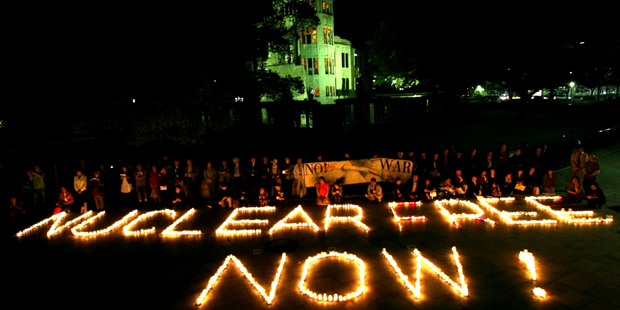
Fundamentos de la abolición de las armas nucleares
The humanitarian case
The abolition of nuclear weapons is an urgent humanitarian necessity. Any use of nuclear weapons would have catastrophic consequences. No effective humanitarian response would be possible, and the effects of radiation on human beings would cause suffering and death many years after the initial explosion. Eliminating nuclear weapons – via a comprehensive treaty – is the only guarantee against their use.
Even if a nuclear weapon were never again exploded over a city, there are intolerable effects from the production, testing and deployment of nuclear arsenals that are experienced as an ongoing personal and community catastrophe by many people around the globe. This humanitarian harm too must inform and motivate efforts to outlaw nuclear weapons.
Catastrophic effects of nuclear weapons →
“Nuclear weapons are unique in their destructive power, in the unspeakable human suffering they cause, in the impossibility of controlling their effects in space and time, and in the threat they pose to the environment, to future generations, and indeed to the survival of humanity.” – International Committee of the Red Cross, 2010
The security case
Nuclear weapons pose a direct and constant threat to people everywhere. Far from keeping the peace, they breed fear and mistrust among nations. These ultimate instruments of terror and mass destruction have no legitimate military or strategic utility, and are useless in addressing any of today’s real security threats, such as terrorism, climate change, extreme poverty, overpopulation and disease.
While more than 40,000 nuclear weapons have been dismantled since the end of the cold war, the justifications for maintaining them remain largely unchanged. Nations still cling to the misguided idea of “nuclear deterrence”, when it is clear that nuclear weapons only cause national and global insecurity. There have been dozens of documented instances of the near-use of nuclear weapons as a result of miscalculation or accidents.
| MYTH | REALITY |
| It’s OK for some countries to possess nuclear weapons. | When it comes to nuclear weapons, there are no safe hands. So long as any country has these weapons, others will want them, and the world will be in a precarious state. |
| It’s unlikely that nuclear weapons will ever be used again. | Unless we eliminate nuclear weapons, they will almost certainly be used again, either intentionally or by accident, and the consequences will be catastrophic. |
| Nuclear weapons provide a useful deterrent against attack. | Nuclear weapons do not deter terrorists. Nuclear-armed nations are actually more vulnerable to pre-emptive strike and terrorist targeting than non-nuclear countries. |
| Nuclear weapons can be used legitimately in war. | Any use of weapons would violate international humanitarian law because they would indiscriminately kill civilians and cause long-term environmental harm. |
The environmental case
Nuclear weapons are the only devices ever created that have the capacity to destroy all complex life forms on Earth. It would take less than 0.1% of the explosive yield of the current global nuclear arsenal to bring about devastating agricultural collapse and widespread famine. The smoke and dust from fewer than 100 Hiroshima-sized nuclear explosions would cause an abrupt drop in global temperatures and rainfall.

Climate disruption and nuclear famine →
“Climate change may be the global policy issue that has captured most attention in the last decade, but the problem of nuclear weapons is at least its equal in terms of gravity – and much more immediate in its potential impact.” – International Commission on Nuclear Non-Proliferation and Disarmament, 2009
The economic case
Nuclear weapons programmes divert public funds from health care, education, disaster relief and other vital services. The nine nuclear-armed nations spend in excess of US$105 billion each year maintaining and modernizing their nuclear arsenals. The US alone spends more than US$60 billion annually, and the British government’s plans to replace its ageing fleet of nuclear-armed Trident submarines could cost taxpayers over £100 billion.
Despite renewed commitments by nations to achieve a nuclear-weapon-free world, all of the nuclear powers continue to invest exorbitant sums of money in their nuclear forces. Funding allocated to national disarmament efforts is minuscule by comparison, and the principal UN body responsible for advancing nuclear abolition has an annual budget of just over $10 million. It is time to redirect money towards meeting human needs.












Fans 0
Followers 131
Subscribers